I’ve always wanted to learn a new language, but figuring out the best app was tough. Babbel and Duolingo are two popular options, each with its own style.
Babbel feels like a more structured classroom, with lessons that dive deep into grammar and real-life conversations.
On the other hand, Duolingo is like a fun game, using short exercises to keep things light and easy.
Both have their pros and cons, but which one works better? In this quick comparison, I’ll break down what Babbel and Duolingo offer to help you choose the best fit for your language-learning journey.
In a nutshell, they differ in.
- Casual learners might benefit from Duolingo if they want to try a few different languages, struggle to stay motivated, or are unwilling to spend money.
- Babbel will benefit students who are serious about learning one language, who need clear explanations, and who want to learn content useful in real-life conversations.
Babbel vs Duolingo: Overview
Below, we have briefly described Babbel and Duolingo to know about them from tip to toe. Let’s start!
What is Duolingo?
In addition to providing online language courses in over 35 foreign languages, Duolingo also offers Duolingo English assessment tests.
The company was founded in 2012 in Pittsburgh, Pennsylvania, US, by Luis von Ahn and Severin Hacker.
It offers the English Proficiency Test, an affordable and easily accessible test accepted by over 3,000 academic institutions worldwide.
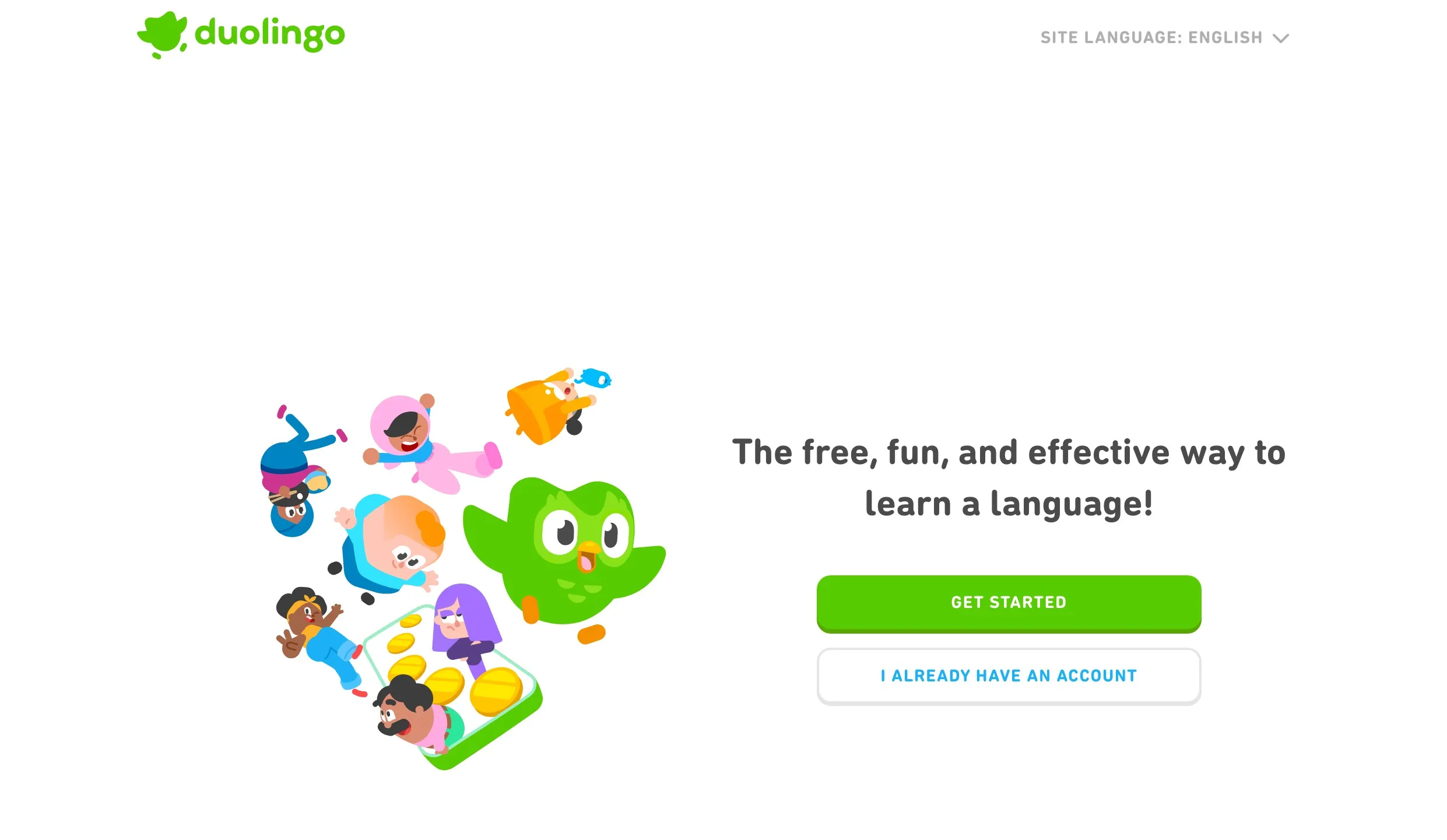
Users can use Duolingo to learn new languages and improve their proficiency in different languages at no cost.
The app teaches the language through game-style techniques that keep users engaged and track their progress.
Apps like this are motivators, especially for beginners and younger audiences learning a foreign language for the first time. Currently, English-speaking users on the platform can access 37 different foreign languages.
Those languages:
- Spanish, Turkish, French, German, Japanese, Dutch, Hindi, Italian, Korean, Chinese, Russian, Arabic, Portuguese, Latin, Hungarian, Swedish, Finnish, Irish, Greek, Norwegian, Polish, Hebrew, Hawaiian, Vietnamese, Danish, Indonesian, Welsh, Scottish Gaelic, Czech, Romanian, Swahili, Ukrainian, Navajo, Esperanto, and Yiddish
- Klingon and High Valyrian are also fictional languages.
According to Duolingo’s data analysis, English is the most popular language among its users, followed by French and Spanish.
What is Babbel?
2007, Markus Witte and Thomas Holl founded Babbel, a German-based language-learning app.
Babbel’s services are tailored toward a specific audience. They offer beginner, intermediate, and grammar courses in different languages, keeping the user’s native language and proficiency level in mind.
In addition, it offers the opportunity to interact with certified language experts through Babbel Live interactive tutoring sessions.
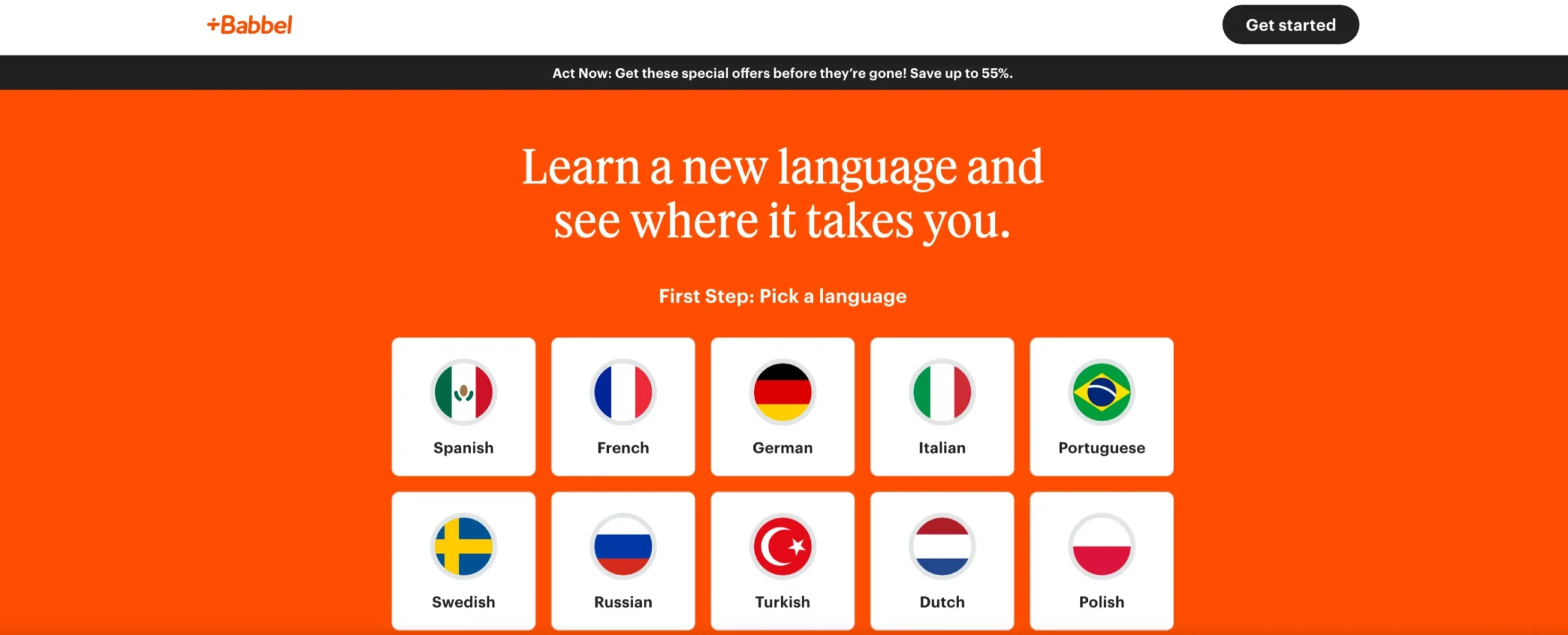
Sabbel is a subscription-based learning platform that offers language courses for a fee. By subscribing to the course, two important things are ensured: One, it ensures that the courses are of good quality, and two, it shows the learner is serious and committed.
Prices are reasonable and affordable, way less than institutionalized language courses. Language-based learning apps can be accessed from a laptop and a smartphone.
There are 14 languages to choose from.
The languages are:
- Spanish
- French
- German
- Portuguese
- Italian
- Dutch
- Polish
- Russian
- Danish
- Turkish
- Indonesian
- Norwegian
- Swedish
- English
Overview Of Babbel vs Duolingo
Choosing between Babbel and Duolingo depends on your language learning goals, budget, and preferred learning style.
Here’s a detailed breakdown comparing these two popular language-learning apps to help you decide which might be the best fit.
1. About Babbel and Duolingo
Babbel is designed for learners who are serious about building practical language skills.
It offers structured courses tailored for beginners to intermediate levels, with a focus on real-life conversations and situations.
Babbel emphasizes grammar and vocabulary through interactive lessons, integrating cultural contexts to provide a more immersive learning experience.
Duolingo, on the other hand, takes a more gamified approach to language learning.
It offers short, game-like exercises that use repetition to build vocabulary and basic grammar skills.
It’s more casual and fun, aiming to make language learning feel less like studying and more like a daily habit.
2. Learning Structure and Approach
Babbel:
- Structured Lessons: Babbel’s courses are structured into levels and lessons, providing a more traditional, step-by-step approach to learning.
- Grammar-Focused: The lessons incorporate grammar tips within exercises, allowing learners to understand the ‘why’ behind language rules.
- Conversation-Based: Babbel uses dialogues and situational examples to help learners practice real-life conversations.
- Course Customization: Offers tailored lessons based on specific needs, such as travel, business, or cultural topics.
- Variety of Exercises: Includes speaking, writing, listening, and reading exercises, giving a well-rounded skill set.
Duolingo:
- Gamified Learning: Uses a points-based, game-like format with levels and rewards to keep users engaged.
- Repetition: Focuses on building vocabulary and basic phrases through repetition. Exercises often include translating sentences, matching words, and listening.
- Casual Learning: Lessons are broken into short, manageable segments ideal for quick practice sessions.
- Wide Range of Languages: Offers more than 30 languages, including some less common ones like Navajo and Klingon.
- Community and Competition: Users can compete with friends, join leagues, and earn badges to maintain motivation.
3. Content Quality and Depth
- Babbel: Offers a deeper understanding of language, grammar, and cultural nuances. Its content is developed by language experts, focusing on conversation skills that are immediately practical. Babbel’s lessons are designed to be progressive, ensuring a strong foundation before advancing.
- Duolingo: While comprehensive for beginners, Duolingo’s content is more limited in depth. It’s excellent for building a foundational vocabulary and getting familiar with sentence structures, but it might not cover nuanced grammar or more complex language skills needed for fluency.
4. Which One Should You Choose?
- Choose Babbel if you’re serious about developing a strong foundation in your chosen language, particularly if you’re aiming to achieve conversational fluency. Its structured courses and focus on real-life communication make it ideal for learners who want a comprehensive and practical learning experience.
- Choose Duolingo if you’re a casual learner, just starting with a new language, or looking for a fun way to practice daily. Its free access, game-like elements, and extensive language list make it perfect for beginners or those learning as a hobby.
Learning Experience At Babbel
What’s it like to learn at Babbel? The first thing you need to do when you enter Babbel is choose a language you want to learn. 13 different languages are available here: German, Spanish, French, Portuguese, Turkish, Swedish, Indonesian, Dutch, Polish, Danish, Norwegian, and Russian.
After you complete the placement test, Babbel will determine your level of proficiency in the language.
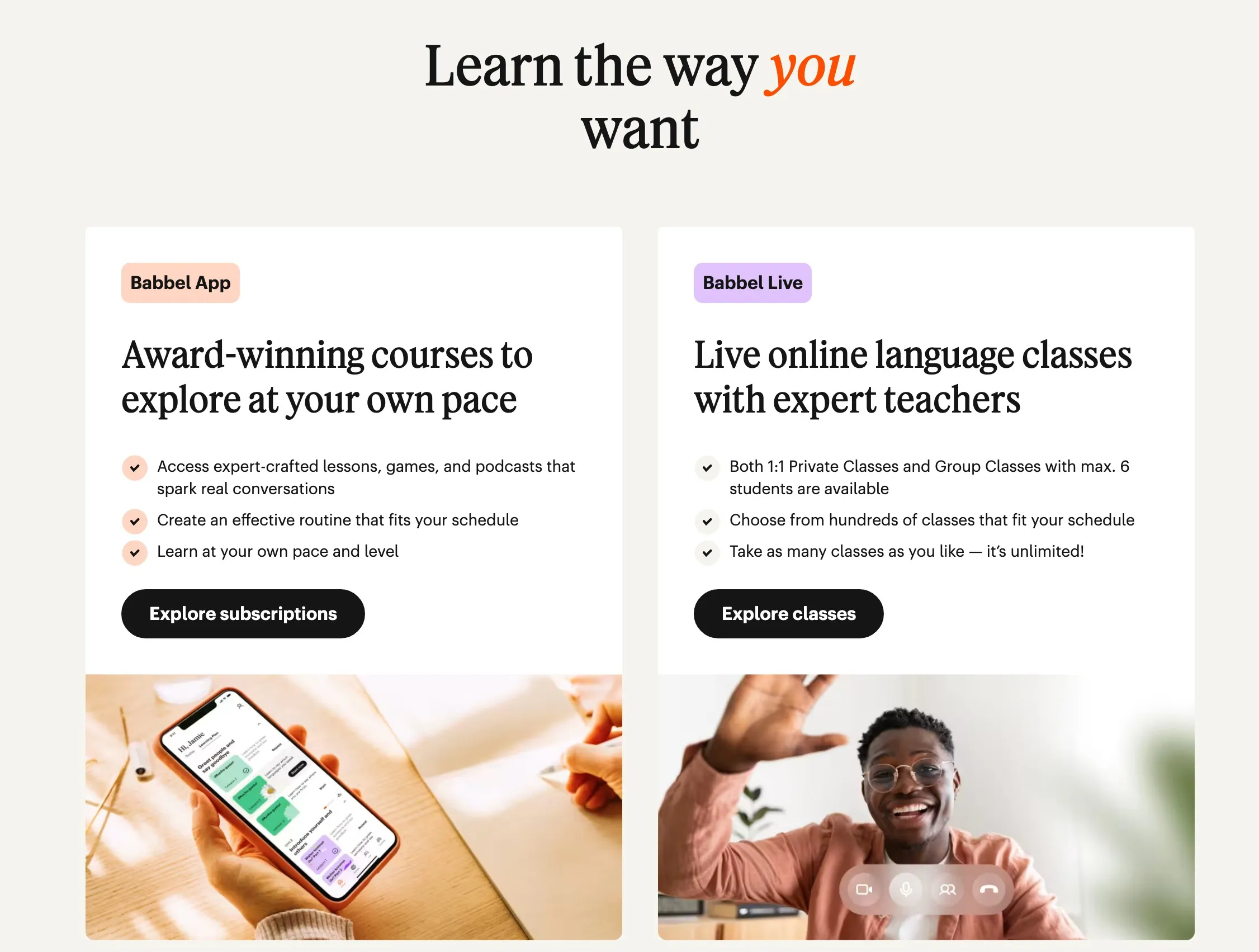
It can also be skipped if you are an absolute beginner and do not know a word in the target language.
A Babbel test will ask you five questions in the language, which it uses to estimate your ability to speak this language.
Taking the introductory lesson will allow you to access all classes. You can also test out Babbel for free before you purchase a subscription.
In the first few lessons, you will learn a few keywords and vocabulary to have very elementary conversations. As you learn the first few concepts and terms, you’ll also develop an understanding of the basic rules.
It is later in the course that Babbel reveals its true beauty. As you move onto the intermediate level, you’ll learn by conversing with others.
This is the best way to learn any language because you’ll be forced to use what you learn rather than memorize some words.
Babbel is more focused on in-depth learning than Duolingo. As a result, you will better understand cultural customs and learn how to interact with people.
Although it’s not as effective as learning as you go along in the real world, it’s good enough to get you at least to B1 (intermediate), which is already sufficient to converse freely with locals and understand a country’s culture.
Learning Experience At Duolingo
You begin learning at Duolingo by selecting the language you wish to learn. More than 30 languages are available, which is pretty impressive.
Then, you will need to take a placement test, or you can jump right into the learning session if you are a complete beginner.
The placement test will have a few questions so that Duolingo can determine your learner level.
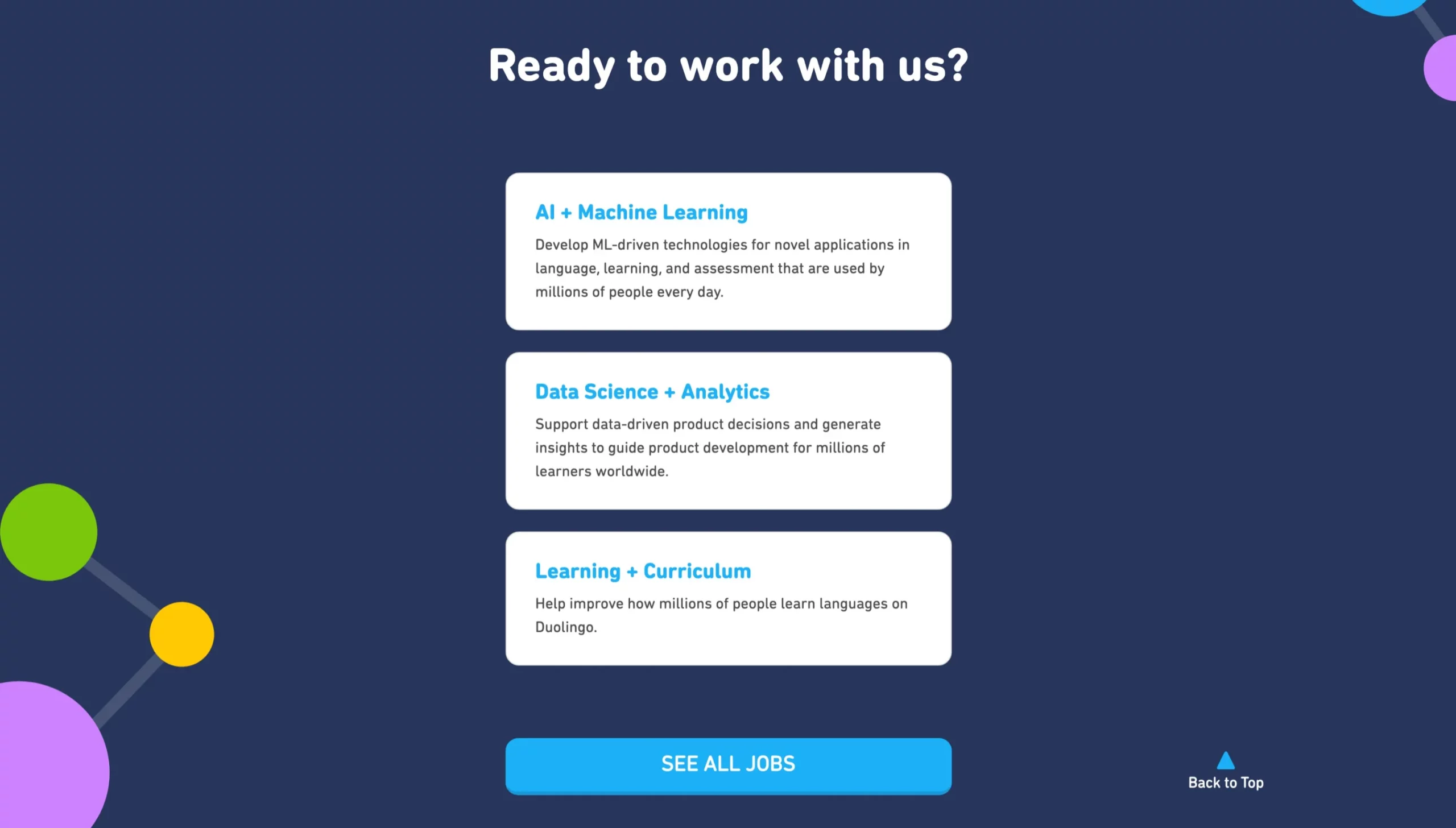
Once you learn the basics of the new language, you can take the basic lessons to learn the vocabulary. The lessons connect new words you learn with their translations through a series of fun lessons.
You begin with simple signs and work up to more complex concepts if you are learning Chinese, Japanese, or Russian, for instance, where the alphabet is quite different.
When learning a new language, you begin with the basics, such as greetings. Here, I am learning Chinese:
Those words are then connected into sentences, and different categories are explored. In addition to learning about hobbies, time, numbers, payments, locations, phrases, and more, you’ll also learn about budgeting.
Duolingo is free, which is great. Additionally, you can easily track your progress by taking 10-15 minutes daily to learn the new language.
Learning never feels boring, either. Gamification tracks your progress as you gain experience and move up the leaderboard.
Babbel vs Duolingo: How Much Do They Cost?
Let’s compare pricing before making a final judgment. Each company offers a variety of subscription packages. The Babbel website offers four different plans totaling four different languages (out of 15 to choose from).
Access to all languages is available with three payment options: a 6-month plan at $8.45 per month, totaling $50.70 with a 45% discount; a 12-month plan at $6.95 per month, totaling $83.40, which is the best value; and a lifetime access option for a one-time payment of $299.50, discounted from the original price of $599.
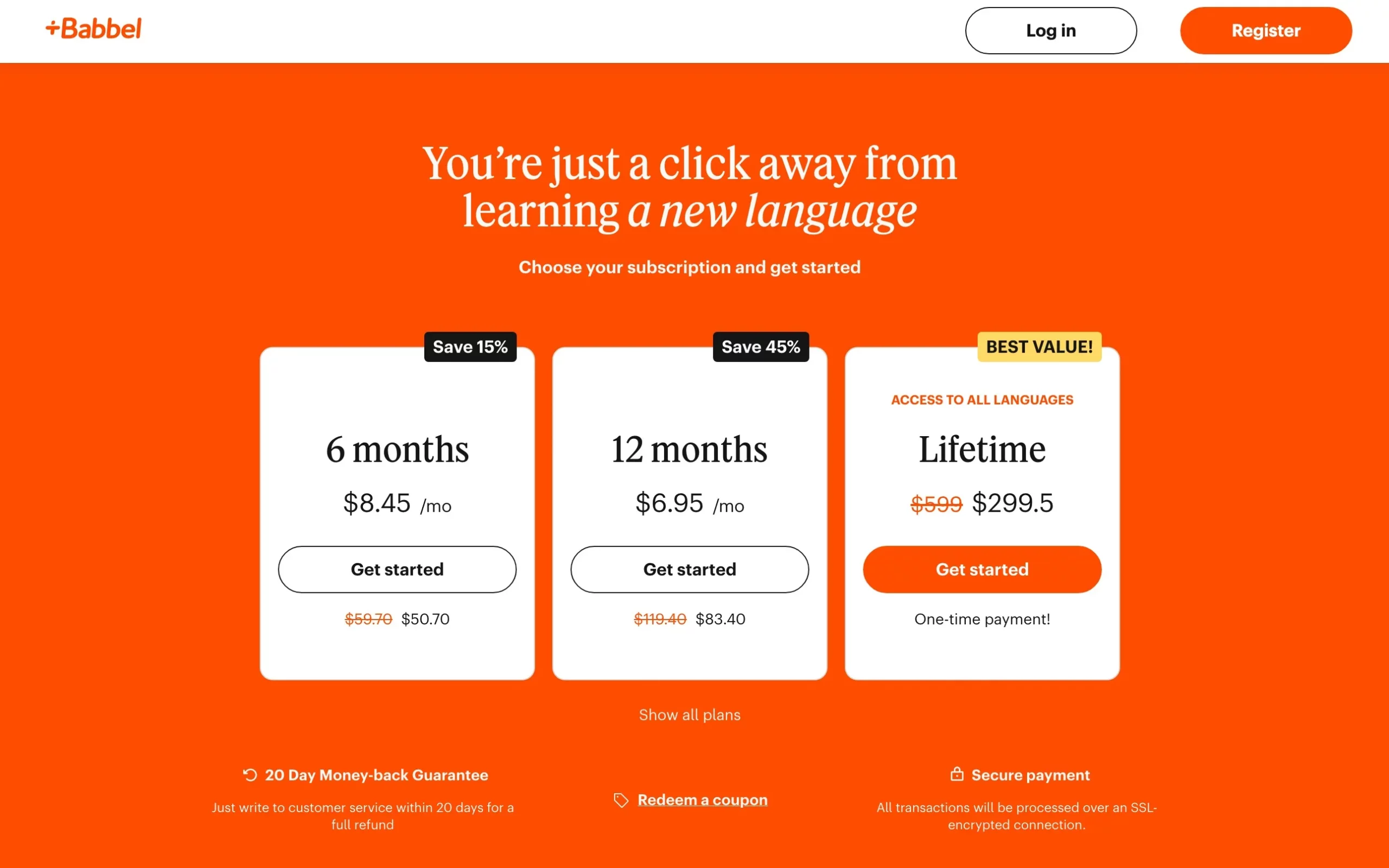
There is a free version of Duolingo (which I discussed above) and a paid subscription plan called Duolingo Plus. The Plus plan costs $7 monthly or $84 per year.
In addition to removing those annoying ads, Duolingo includes unlimited hearts, unlimited test-out attempts, and personalized lessons to help you review your mistakes, among other things.
Therefore, both companies charge about the same for their paid plans. An annual subscription will cost you around $7.99 or $47.99 per year if paid upfront. Honestly, I’m not sure who wins here.
Babbel and Duolingo have lower prices than competitors like Rosetta Stone and Pimsleur. Moreover, both companies offer consumers the option of testing their programs before committing.
In Babbel, you have a 20-day money-back guarantee if you’re unsatisfied; in Duolingo, the Plus subscription comes with a 14-day free trial.
Babbel vs Duolingo: Pros and Cons
Pros Of Babbel
- Each individual’s needs and goals are taken into account when curating courses.
- You can practice speaking by using real voices to hear and understand accents, enunciations, and the right pronunciation of words.
- Rather than focusing on grammar and vocabulary, the app emphasizes real-life conversations and encourages users to learn through using the language instead.
- It is a great app for beginners and intermediate learners who want to brush up their language skills at a reasonable price.
Cons Of Babbel
- On the platform, users pay for language courses.
- Compared to its competitors, Babbel offers fewer languages.
- Advanced learners should not take these courses.
- The multiple-choice questions, the quiz structure, and the recall component limit independent thinking.
Pros Of Duolingo
- There are 35 foreign languages available at no cost
- Multiple languages can be learned simultaneously by users
- These courses provide an introduction to the languages and are great for learning basic vocabulary, sentence structure, and common phrases.
- Each lesson is between 5 and 20 minutes long, with a quiz at the end.
Cons Of Duolingo
- This app can get repetitive and monotonous because of its robotic voice and lessons.
- There are no real incentives and a high risk of losing interest.
- There is no explanation for why an answer is correct or incorrect.
- This course is not intended for those who wish to become fluent in multiple languages.
- Constant notifications and alerts can be annoying.
FAQ
👉 Is Babbel better than Duolingo?
Babbel has several advantages over Duolingo that we have thoroughly tested and compared. Our reviewers rated Babbel as the superior app over Duolingo based on its curriculum, teaching style, and delivery.
🤟 What's the difference between Babbel and Duolingo?
Babbel and Duolingo differ primarily because Babbel focuses on a more robust and traditional way of teaching a foreign language. In contrast, Duolingo is focused on gamifying your learning and offering a modern experience.
🤚 Is Babbel or Duolingo better?
In my experience with both programs, Babbel is more effective, engaging, and offers more guidance than Duolingo. The only thing I like about Duolingo is that it's free. However, Babbel is your best bet for overall language learning.
Quick Links :
- Coursera vs Udacity
- BestMyTest Review: Best TOEFL Preparation Courses?
- Top Best NLP Training Courses & Certifications
- Experfy Review: Can You Really Trust Their Courses?
- Educative Review: Best Online Learning Platform For Software Developers?
Final Verdict: Babbel vs Duolingo 2026
Do you prefer Babbel or Duolingo? Based on my tests, Babbel gets the nod. Although the two companies are similar in many aspects, I find Babbel’s language learning program to be better overall.
Although I like Duolingo’s free version and how it tries to gamify learning, Babbel would be the better option for serious language learners. Babbel is more consistent and accurate when it comes to using natural sentences and correct translations.
Additionally, Babbel gives you a better opportunity to improve your conversational skills, which are crucial to learning a language. They also have better-organized live classes.
All in all, Babbel is the best language-learning software from top to bottom.
